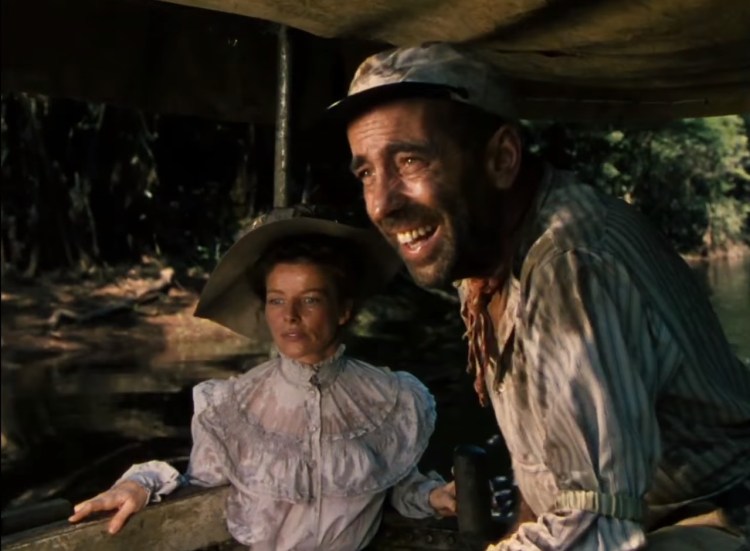
Recommended for its entertainment value as well as its cultural significance, The African Queen is delightful. When puritanical missionary Rose Sayer (played by Katharine Hepburn) and gin-loving, freewheeling riverboat captain Charlie Allnut (Humphrey Bogart) take a wild river ride together, they find a surprising connection to each other. Their journey isn’t easy, though; the film is set in the Congo during WWI, where the duo has to overcome the perils of the river and of the Germans.
The story begins in the village of Kungdu in German East Africa, where Samuel Sayer and his sister Rose serve as British Methodist missionaries at the beginning of the WWI in August of 1914. At first, the missionaries are unamused by the gruff mechanic Charlie Allnut, who delivers their mail and supplies via the African Queen steamboat. Things change swiftly when war breaks out between Britain and Germany, though; chaos ensues as German troops burn the village and push for the occupants to fight for the Germans. Protesting their actions, Rose’s brother Samuel is struck by a German, after which he contracts a fever and dies. Charlie steps up and helps Rose bury her brother, and the two have little choice but to escape on the Africa Queen. During their voyage, they hatch a plan to sink a German warship named Louisa, too.

The African Queen is an archetypal tale of duality between two headstrong characters who clash at first, but evolve with the story, becoming more open to each other, and finding betterment in doing so. During their journey, Charlie learns to clean up his habits and to allow someone else to contribute to the decision-making, and Rose relaxes her stiffness and eventually gives into her emotions for Charlie. Watching the two go from quarreling travel mates to developing a magnetic attraction for each other is a treat, and their relationship is mixed with great humor as well as depth. Although I have not read it, many agree that the C.S. Forester novel does not really contain the humorous aspect that the movie adopted, and reportedly, the two main actors were already funny together so director John Huston encouraged their witty improvisations.
The developing chemistry between Rose and Charlie is surprisingly magical, and as intense as the scenery, which is also mesmerizing. Filmed in the Congo, one really unique aspect of the film is that the majority of it takes place on the steamer, relying heavily on the dialogue rather than on effects or distractions, as a well-crafted play would. And when the effects do come into play, they are believable.
The African Queen was directed by John Huston, who also worked with Humphrey Bogart on the film, The Treasure of the Sierra Madre. James Agee wrote the screenplay adaptation for The African Queen based on the 1935 novel by C.S. Forester.





